
by Lisa Fuller | Jun 11, 2016 | Encouragement, General, Motivation, Mutual Respect, Parenting
by Victoria Thorp
 In recent weeks, a new book called “Grit,” by Dr. Angela Duckworth has made quite a splash, with coverage in news outlets from CBS News to NPR to the New York Times (even David Brooks loved it).
In recent weeks, a new book called “Grit,” by Dr. Angela Duckworth has made quite a splash, with coverage in news outlets from CBS News to NPR to the New York Times (even David Brooks loved it).
Maybe you’ve read these stories or perhaps bought a copy of the book yourself. Or maybe, because it’s spring and you can barely manage the onslaught of graduations, science fair projects and final exams, you’ve been in a media blackout. Either way, I have good news: this post will explain what ‘grit’ means and why it matters to you as a parent.

Angela and I in San Francisco, May 2016
Full disclosure: Dr. Duckworth is a friend and former colleague of mine, so I’m not new to the topic of grit, nor am I fully objective about Angela. But here’s the thing about Angela: besides winning a MacArthur ‘genius’ grant and working as psychology professor at the University of Pennsylvania, she’s also the mom of two middle school girls.
And I know from a recent conversation with Angela that she’s just as humbled by the challenges of parenting as we are, despite a best-selling book and her professional success.
Here’s my attempt to boil down her brilliant book into one page…
What does ‘grit’ mean?
Dr. Duckworth (hereafter to be described as Angela) defines ‘grit’ as a combination of passion, effort, and persistence applied toward a goal over a prolonged period of time.
Why does grit matter?
According to Angela’s extensive research, grit appears to be a strong predictor of life-long success and happiness — perhaps more so than innate talent or IQ. “Our potential is one thing,” she writes. “What we do with it is quite another.”
As a parent, I appreciate this definition because it breaks down the ‘talent myth’ that seems to dominate our popular understanding of why people are able to accomplish their goals. Whether it’s looking at athletes, artists, or even entrepreneurs, stories of victories and accomplishments are usually told as if these winners were born with a particular gift that made their dominance inevitable .
What’s different about grit?
Angela’s explanation of grit provides another narrative for understanding these stories, too. One that examines the persistence that these champions applied towards their goals, their ability to not give up even in the face of failure, and the specific, difficult and prolonged practice they applied to the craft/sport/skill they were trying to improve.
Here in the Bay Area, Steph Curry is the most famous example of an athlete who wasn’t considered to have much potential as a youngster, but who’s risen to the top of the game through his determination, endless practice, and dedication.
So how can we find our passion (or help our kids find theirs)?
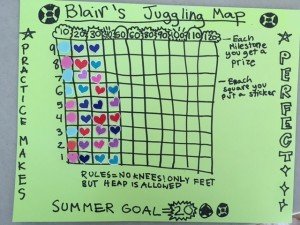
Never discount the power of the chart to motivate kids to reach a goal- especially charts they make themselves (note that goal has yet to be met but working on it!)
At least where I live (Palo Alto, California, U.S.A.), passion is the newest element that kids are supposed to add to their dazzling college resumes. It’s not enough to have great grades and do varsity sports, now teens are supposed to also have a “passion,” whether it’s global warming or raising foster dogs.
That’s why I loved the part of Angela’s book where she explains in detail what it means to have a passion and explores exactly how people stumble upon the “thing” that they end up pursuing with so much grit.
Angela has some experience with trying to find a passion because she spent time as a neurology grad student, management consultant, high school teacher, and tech COO before realizing that her true path lay in the study of psychology (she entered the PhD program at Penn when she was pregnant with her first daughter).
Why it’s hard to find a passion
Some people may realize like a bolt of lightening that they want to study sharks or cure childhood obesity, but most of us won’t have the luxury of this sort of epiphany.
We’re more likely to figure out what we love through multiple exposures and prolonged engagement with something that we might ‘sort of’ like or be ‘kind of’ interested in.
In fact, it may take longer than you’d imagine before you realize what it is that you must pursue.
The reason it takes so long is because of how our brains work.
When people are bored, they know right away. Researchers can ask people if they’re bored when doing a task and they will be very clear if the answer is yes.
It’s much harder to ascertain if a person is truly interested in a task.
When researchers ask people, “Are you interested in what you’re doing?” the answer is often, “Not really.” But these same people will manifest behavior that looks a lot like interest — continuing to do the task, not wanting to break away from it, etc.
It takes lots of exposure to something for kids to develop an interest in it…
For parents, this means that we have to keep exposing our kids — over and over again — to activities, ideas, and pursuits that they may not express a ton of interest in.
Sounds hard, right? Likely it’s a process we’re all familiar with at the dinner table. You’re tempted to never make broccoli again after your kids reject it a few times. But you know their tastes keep changing and experts recommend that you bring back foods that were previously rejected or your kids will eat nothing but white rice for the rest of their lives.
So when it comes to interests and passions, it’s most beneficial to our kids if we give them multiple exposures to a variety of different pursuits … that we not have a fixed mindset about what may interest them as they grow and change.
So if kids try lots of things and quit, what then?

This photo links to Angela’s TED Talk
Angela has a rule in her house — never quit on a rainy day. In other words, never quit because of having to play in bad weather or striking out, or experiencing some other adverse situation.
Instead, encourage your kids to get through the season and to not quit until there’s a natural stopping place (could be the last session you paid for, etc.)
What if kids have a passion for something that you find less than inspiring?
From Minecraft to marijuana legalization, kids can get fixated on pursuing interests that feel less than ideal. So what to do?
That’s a tough one and Angela has not addressed it directly. But she does have another rule in her house I thought was a good: everyone has to do one ‘hard thing.’
On CBS news she said, choosing the ‘hard thing’ is not an open-ended question — it’s multiple choice.
While her teen girls might be passionate about Instagram, Angela is clear that they can’t choose that as their ‘hard thing.’ Instead, it has to be a sport or musical instrument.
Sports or musical instruments may not be right for your family, but the idea is to encourage your kids to pick something they have enough interest in to pursue and get them to stick with it long enough to make progress.
Can grit be taught or is it just a trait you’re born with?
There’s a lot of debate about this question. Angela gives some ideas for how to ‘grow grit’ but they are more anecdotal, perhaps because the research here is a bit less clear.
I have two girls and one is definitely more naturally gritty in the way Angela defines it. She sets goals and tends to stick to them, and loves to practice and get better — she’s inspired to improve (flute and soccer are her main areas of focus).
My other daughter has lots of big ideas, but often abandons her plans before they’re fully realized, and isn’t particularly driven to practice. So my tiny data set would lead me to the conclusion that there is some innate element to grit.
While you can’t teach your kids to have innate drive, by setting clear expectations around commitment and practice, you increase the likelihood that they’ll experience the relationship between effort, time and progress.

My daughter worked for a year to over come her fear of running hurtles.
My less gritty daughter’s found a track program that she loves. She’s kept running for several years. She’s motivated to train with her team; and while she doesn’t do much practice on her own, she’s made noticeable improvement. The findings in Grit support the idea that sustained practice is best done with a coach — and that it’s tough to independently figure out where and how to improve.
I have no idea if my girls will pursue these interests for their whole lives, but I’m trying to encourage them to keep going long enough to feel competent, as I do believe competence builds confidence. And you can’t get to competence without putting in the time.
One big thing that ‘gritty’ people have: purpose
And finally, one of the most compelling parts of Angela’s exploration of grit is the connection she makes to purpose.
From her many conversations with gritty people, she discovered that beyond perseverance, persistence, and prolonged practice, they all shared a belief that what they do is important, valuable or makes a difference in the world in some way.
This was true for musicians, athletes, business people, and even one sanitation worker she interviewed. And she has some great tips for trying to find purpose. (Read the book!)
So now you’re wondering…how gritty are you?
You can take the ‘grit scale’ and find out how you rank on Angela’s assessment.
I’m in the mid range in terms of grit — I bounce around from interest to interest and have never had a laser focus on one thing. It’s a good personality for a writer! But reading Angela’s book gave me new inspiration to look hard at the things I dabble in and try and commit more deeply so I can continue to grow and learn. Even an old dog can get gritty…or so I’d like to believe!
Are you getting gritty with your kids? Or skeptical that grit is yet another parenting fad? Post a comment and let us know!
Victoria is the founder of Palo Alto Pulse, a website that shines a light on the people and ideas that make Palo Alto such a cool place to live. She is also a senior contributing writer for the Doris and Donald Fisher Fund in San Francisco, where she supports the work of KIPP charter schools and other innovative educational organizations. Victoria lives in Palo Alto with her two teenage daughters, her husband and, the grittiest member of her family, her dog Abby.
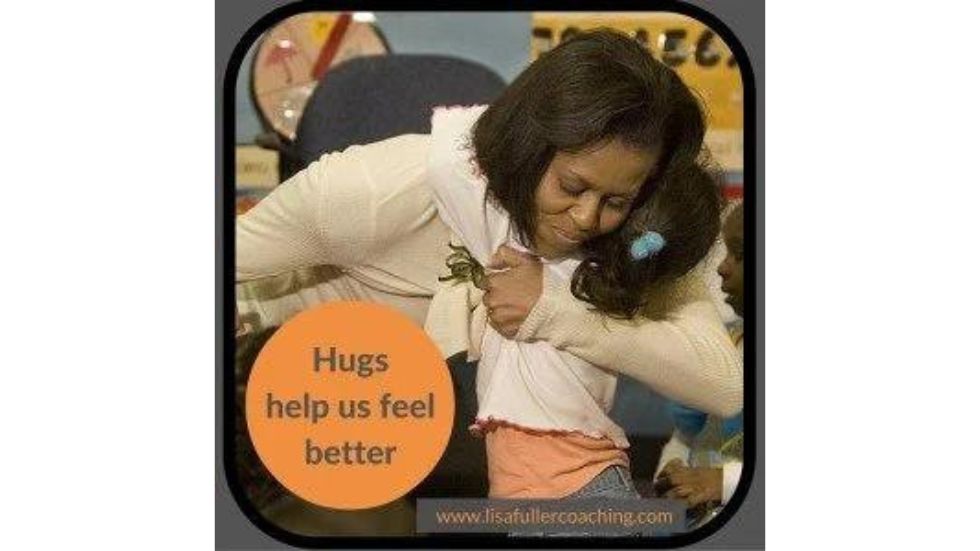
by Lisa Fuller | Mar 26, 2016 | Communication, Connection & Love, Encouragement, General, Parenting, Self-regulation
Shortly after Eric finished up my 7- week parenting series, he sent me this story which beautifully illustrates the power of asking for a hug.
Last week on my way home from work, my wife Stephanie sent me a text that our daughter Grace (5) was being a handful, was in a horrible mood and that she had had it with her.
When I got home, I walked into the house and went straight to Grace and asked her for a hug. At first she turned her back and crossed her arms, and said no.
I then decided to ask her one more time and after a 5-second pause, she turned and gave me a big hug.
Steph said it was like someone flipped a switch on Grace. She went from being in the worst mood to acting as if she was having the best day ever.
It’s amazing to see the kind of impact and dynamics that something as simple as asking for a hug can have on a 5 year old.
Honestly, before taking your class, I probably would have come home and punished Grace for misbehaving and the entire afternoon would have been ruined for the whole family.
Asking for a hug sounds almost too easy, right? Too simple to be true?
However, while it’s simple… there’s a subtle tweak that’s key to the effectiveness of this parenting strategy.
“I could use a hug” vs. “Can I give YOU a hug?”
The first taps into your child’s deep need for significance and belonging. When you ask for a hug from your child, you acknowledge that they make a difference to you and in fact have a positive influence on your life.
In the later, you are reinforcing what your child hears and perhaps feels frequently: That children need help from grownups to feel better.
The parenting tool of asking for a hug (for YOU) is simple, easy, and effective if done from the perspective of genuine connection, genuine desire for your child to assist you! (Plus, who doesn’t love hugs? I love it!)
Try it out.
Ask a friend to be your parent and say these two phrases to you:
Could you give me a hug?
and
You look like you could use a hug.
Do you notice a difference in how you feel after each?
This week look for an opportunity to ask your child for a hug.
I’d love to hear how it goes in the comments below!

by Lisa Fuller | Sep 22, 2015 | Encouragement, General, Motivation, Parenting, Problem Solving, Sibling Issues
It just slipped out. I didn’t mean to say in front of the 25 parents who’d come to learn strategies to solve sibling conflict. There’s something about it that just didn’t sound right. Actually it sounded like the antithesis to everything out there selling like hotcakes in the world of public opinion parenting.
I said it. “Positive Discipline (PD) is lazy parenting.”
While that’s not exactly accurate, it can feel effortless when you’re in the PD Zone compared to the prevailing helicopter/effortful parenting mode.
Here’s what I see with parents I work with and what I’ve experienced firsthand…
You’re working so hard to parent your child in a way that will encourage them to grow into loving, responsible, contributing members of society. Let’s add a cherry or two on top and throw in hard working, honest, happy, conscious of the world around them, yada yada the list goes on.
Looking at it straight on, it’s freaking intimidating.
No wonder you’re stressed about the hitting, lying, excluding, whining, complaining, isolating, arguing and bad attituding that’s happening today.
Who has the luxury to be lazy when vigilance is required to produce the qualities you know are so important for your child’s success?
What’s clear is that while control might feel necessary, and to some degree satisfying, in the moment, control, as a parenting style doesn’t invite the long term character traits you desire.
In short, control creates hollow results. When you do it all for your child (decide it all, manage it all, enforce it all), you inadvertently rob your kids of the opportunity to practice valuable life skills that they can only learn by doing.
With ‘good character’ as the destination, your child must travel through mistake-ville which inevitably leads to growth-town. They need to learn how to solve problems and think critically about the world around them in order to become who you want them to be. And that takes practice.
I stand behind what I said. [tweetthis]Positive Discipline can feel downright relaxing at times – – – lazy even. And that’s a good thing![/tweetthis]
Here are three real life examples, featuring a variety of ages, followed by the how-to tips for effective lazy parenting.
Example #1 from Kelly:
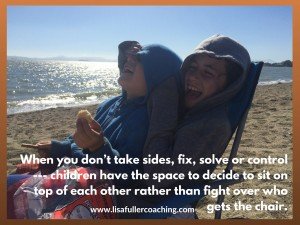 While enrolled in my spring sibling series, Kelly sent me this email after our first session.
While enrolled in my spring sibling series, Kelly sent me this email after our first session.
These pictures were taken on Father’s Day right after I used “put in same boat” technique & validation. The boys were fighting over the chair (we only had one) and I said, “hmm, one chair and two boys?”... Then Emmett had a solution. Xo
“hmm, one chair and two boys?”… elegant indeed. No refereeing or setting a timer to make sure it was fair, just a simple, observing, genuinely curious question.
 Kelly’s story reminds me that when you don’t take sides, fix, solve, control — children have the space to use their own intelligence to figure things out and come up with their own, often elegant solutions.
Kelly’s story reminds me that when you don’t take sides, fix, solve, control — children have the space to use their own intelligence to figure things out and come up with their own, often elegant solutions.
That said, if your children are accustomed to you fixing, solving, refereeing, it will take training, practice, and time for them to reach for their own intelligence when faced with a problem.
Kelly’s tool of choice in this example was to ask a curiosity question (being genuinely curious about what solution they would come up with!) while treating kids the same (in PD lingo we call this putting them in the same boat… or in this case chair!)
Example #2 from Rochelle:
I have long been critical of parents who swoop in to solve their kids’ social problems, whether they be in school or on the athletic field. But when it comes to homework, I was clearly piloting this ‘chopper.’ Despite the fact that my son was just two years away from going off to college, I was still checking the online homework program for assignments and grades on a daily basis and harping at him about the status and quality of his work.
Both of us were miserable: my son blamed me if he missed an assignment and I felt angry because he wasn’t taking responsibility for his own work. But why should he? How could he, when I was always looking over his shoulder?
This year my husband and I decided we would take a different approach, we’d let our son be the master of his own destiny, free to make his own mistakes.
It was scary; he’s a junior in high school and there’s a lot of pressure on him to do well in school. While we worried that our messy, disorganized son, would lose important papers and forget about tests or quizes, we have been more than pleasantly surprised. He has risen to the occasion.
When he forgot to do an AP assignment, he took responsibility for his inaction, contacted the teacher and asked for an extension. It was the first time I could genuinely say I hoped she would be supportive and honor his request. He’s learning to take responsibility, we’re learning to let go and let him succeed (or fail) on his own, and our relationship is so much stronger for it.
Rochelle’s tool: having faith in her son period and showing faith in him by giving him the opportunity to make mistakes and then learn from his mistakes. Rochelle is taking the long range view, knowing the lessons he will learn outweigh the in-the-moment forgotten assignments, etc.
Example # 3 from Eric:
Eric emailed me this success story while he was enrolled in my series:
Last week on my way home from work, my wife Stephanie sent me a text that our daughter Grace (5) was being a handful, was in a horrible mood, and that Stephanie had had it with her.
When I got home, I walked into the house and went straight to Grace and asked her for a hug. At first she turned her back and crossed her arms, and said no. I then decided to ask her one more time and after a 5 second pause, she turned and gave me a big hug.
Steph said it was like someone flipped a switch on Grace. Grace went from being in the worst mood to acting as if she was having the best day ever.
It’s amazing to see the kind of impact and dynamics that something as simple as asking for a hug can have on a 5 year old. Honestly, before taking your class, I probably would have come home and punished Grace for misbehaving and the entire afternoon would have been ruined for the entire family.
Eric’s tool: Asking for a hug (note this does NOT mean asking your child, “do YOU need a hug?” You spark your child’s sense of significance when you ASK them for a hug signalling that your child makes a difference to you — they’re giving you a hug has an impact.) Pretty easy.
Warning: Don’t try letting go of control once and give up when the results don’t look exactly as you’d hoped. Children need to adjust to your new behavior — they’ll test and maybe test some more until they can trust your change is enduring.
What does lazy parenting require from us?
- Flexibility – if you’re not dictating and controlling the outcome, you need to be open to a different outcome.
- Patience – when children are figuring it out they’re bound to make mistakes, a mess, etc. Beam out to remember the bigger picture — long term character building and ahhhh lazy parenting!
- Humility – finding that place inside that accepts your limits – you might not have the answer, and what a relief that you don’t have to solve every problem.
- Faith in your kids — messy faith. Their solution may not look good and the neighbors could see or hear a mess. Your belief in them, regardless of what their solution looks like, will go a long way to build their problem-solving muscles.
What Kelly, Rochelle and Eric demonstrated seemed pretty easy and parenting can be— AT TIMES — when we’ve established a relationship of trust. Lazy, or if it makes you feel better, call it ‘conscious effortless parenting’ is possible, feels awesome, and can be yours!.
I want that for you!
Share your experience of lazy parenting in the comments below. Don’t be shy.
Want to read more about this topic? Here’re some good posts:
Being “In Control” – The Possible and Impossible In Parenting from Hand in Hand
Control Freak vs. Pushover Parenting: Why Niether Works

by Lisa Fuller | Aug 15, 2015 | Connection & Love, Encouragement, General, Parenting, Self-care
This summer’s been a doozy. What once felt like a series of mini health crises has come to feel like the norm with appendicitis, stress fractures, depression, drug addiction, cancer and even death becoming a more common part of life.
Last summer, I started writing a post about how to parent when you feel distracted or distraught by a loved one’s suffering.
It’s a hard topic. So hard, that I never completed the post. I couldn’t bring myself to put a bow on it and send it to you. My thoughts never felt right or complete or enough.
Now, it’s back around as I’m dealing with my own health struggles. This week I had two areas of infiltrating basal cell carcinoma surgically removed from my face. With the surgery behind me and plenty of ice packs, I feel a sense of deep gratitude. My doctor described the tumors as nasty and aggressive and I’m lucky that they could be removed.
So I ask for myself and maybe you too – how do you parent when you’re struggling with your own or a dear one’s illness?
This is what I’ve gleaned talking with some of you and pondering the question these last 12 months:
-
- Keep it simple. When your child’s needs feel draining of the little resources you have serve macaroni and cheese or Cheerios and let them watch TV. It’s okay.
-
- Prioritize. Allow what’s most important to rise to the top. Family, food, sleep, and exercise (if possible) make up my essential list.
-
- Say no mostly and yes only if that YES will enhance your life. Time and energy are limited. Use yours wisely.
- Reach out intentionally. Ask for help — as my friend Liz says, “you may need to get over yourself” to do this. Remember that close friends want to lend a hand, particularly when a bigger situation leaves them feeling helpless.
I “got over myself” this past week when my friend Carolyn came bearing flowers the day before my surgery. Having had a similar experience, Carolyn warned me that the hardest part for her had been after the procedure, when she had to remove and replace the bandages. I immediately asked if she would be willing to come over and help me do that. She said yes, and little did I know just how important it was to have her for moral and physical support. With 22 stitches across my hairline — and as the doctor put it, “too many to count” in my nose — I was weak and close to fainting. It took us an hour and a half to remove and replace all of the dressings that first time. I can’t imagine what it would have felt like to do this alone.
-
- Stick with the facts. Depending on the age of your child, share relevant factual information, but only the surface story. They don’t need to know the details and certainly not your “what if” fears. While your fears may be in the realm of possibility, they’re not the facts.
-
- Be childlike. As much as you can, allow your child’s aliveness and awe of life to touch you and lift you into the present.
-
- Dare greatly by saying no to guilt. Instead, accept that you may be more foggy and distracted than you’d like to be with your kids. It’s okay. Don’t add parent guilt to the list of your full bucket of worries. In Daring Greatly Brené Brown writes, “To set down those lists of what we’re supposed to be is brave. To love ourselves and support each other in the process of becoming real is perhaps the greatest single act of daring greatly” (Page 110).
- Lower your expectations. Finally, be realistic about how much your kids, depending on age, will be able to empathize with you or the situation. In my experience that’s NOT MUCH. They don’t get it, nor should they.
 A few years ago, my brother’s best friend and brother in-law, Steve, died unexpectedly during a surgery. Because Steve was beloved by his community as a volunteer firefighter during the Eastern Long Island pine barren wildfires, acting as Chief of the fire department at the time of his death, founder of the junior volunteer firefighter training program and a village civil servant, the community put on a huge uniformed procession for the funeral. Being family and a close friend, my brother delivered the eulogy. In the midst of the long funeral procession through town, his 8 year-old son Aidan turned to him and asked in a tired voice, “when is this going to be over?” My brother was both heart-broken and relieved by the question. How could Aidan, who’d loved Uncle Steve deeply, be ready to move on? Be so oblivious to the gravity of the situation? Be so cold as to be DONE with Steve? At the same time – in Aidan’s question my brother heard hope and the possibility that life could go on – that tomorrow would eventually arrive and maybe it was sooner than my brother thought possible. In his son’s words were the innocence and gravity of the truth that we do go on, even when we lose the unloseable friend, even when we suffer unimaginable pain.
A few years ago, my brother’s best friend and brother in-law, Steve, died unexpectedly during a surgery. Because Steve was beloved by his community as a volunteer firefighter during the Eastern Long Island pine barren wildfires, acting as Chief of the fire department at the time of his death, founder of the junior volunteer firefighter training program and a village civil servant, the community put on a huge uniformed procession for the funeral. Being family and a close friend, my brother delivered the eulogy. In the midst of the long funeral procession through town, his 8 year-old son Aidan turned to him and asked in a tired voice, “when is this going to be over?” My brother was both heart-broken and relieved by the question. How could Aidan, who’d loved Uncle Steve deeply, be ready to move on? Be so oblivious to the gravity of the situation? Be so cold as to be DONE with Steve? At the same time – in Aidan’s question my brother heard hope and the possibility that life could go on – that tomorrow would eventually arrive and maybe it was sooner than my brother thought possible. In his son’s words were the innocence and gravity of the truth that we do go on, even when we lose the unloseable friend, even when we suffer unimaginable pain.
I’ve decided that it’s okay that I don’t have a bow on this one. Its a question that doesn’t have a neat answer.
Please chime in with your thoughts and questions in the comment section. How do you parent when you feel overwhelmed by your own or a loved ones health challenges or a death?
What advice would you add?
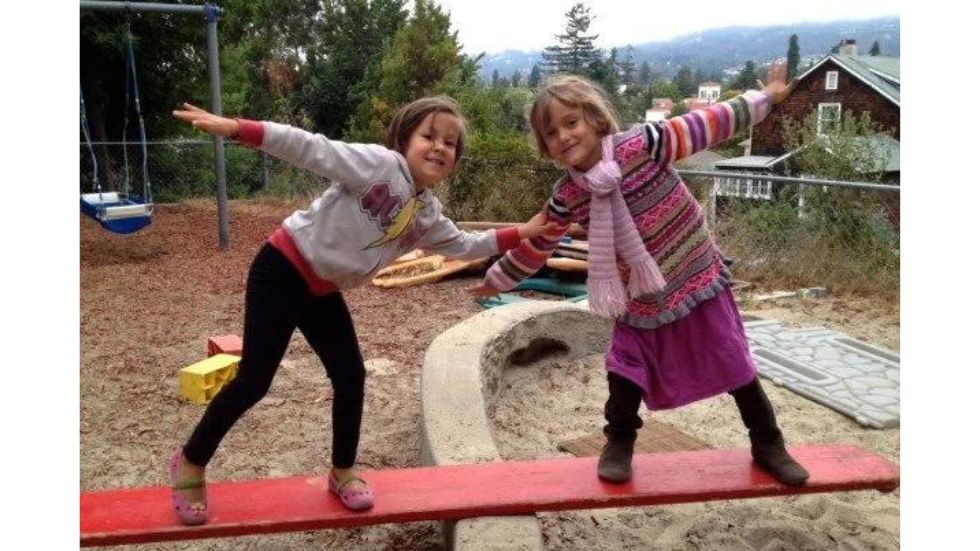
by Lisa Fuller | May 12, 2015 | Communication, Encouragement, Feelings & Emotions, General, Parenting, Sibling Issues

Practice Scripts for Parents: So you can stop unwittingly contributing to your children’s fighting
In Part One we looked at the tremendous learning that results from sibling relationships.
In Part Two we looked at the importance of staying out of your kids’ fights after establishing — and repeatedly reminding kids of — family rules and expectations. (Here’s the index with all of the resources.)
Here in Part Three we’ll explore what you do, unintentionally, to increase sibling acrimony and what you can specifically, say or do instead.
Imagine …
Scenario 1: You’re at a work meeting with your colleague (Joe) and your boss (Big Cheese). You and Joe present what you’ve been working on for the last month at which time Big Cheese looks Joe in the eye and says, “Joe what you’ve done here is outstanding work— you’re exceptional, you really are.”
Be with that. What runs through your mind, your heart?
Scenario 2: You come home after what’s been a bad day and share with your spouse what happened at work, “I just finished this huge project. Joe and I presented it to the Big Cheese, and well, you had to be there, but I felt really unappreciated. It made me feel like crap actually. I put so much of myself into that project, but he didn’t recognize me at all.”
Then your spouse replies, “You know you make a difference — the work couldn’t have been done without you. You need to remember you’re good enough whether someone tells you or not.”
Be with that. What runs through your mind, your heart?
While these are adult scenarios, what they illustrate are common mistakes we make with our children. Sometimes, daily.
The first scenario highlights the perils of praise — the non-specific superlative — and how the use of praise is particularly detrimental to the sibling bond.
How did you feel when you imagined yourself in the scenario?
In parenting class we role-play a parent praising one child but not the other. The volunteer playing the sibling not receiving praise — without exception — feels badly about themselves and usually resentful of their praise worthy sibling.
The un-praised sibling goes on to assume that the accolades lavished on sister or brother mean they’re destined to fall short… big time. Right or wrong this is a predictable human response.
In scenario 2, I’ve put the spotlight on how the denial of feelings, while well intentioned (like praise), is in fact discouraging because it communicates that we’re wrong when what we crave is to feel understood.
Below are four parent behaviors that hurt sibling relationships, followed specific examples of what they sound like and what you could say instead.
PRAISE ➜ ENCOURAGE
- Wow — you’re the fastest swimmer out there! ➜ I love to watch you swim!
- You’re such a good boy! ➜ I appreciate your help, you made my day easier.
- With more work, you’ll get it right. ➜ Look how far you’ve come, you can do it.
DENY FEELINGS ➜ ACKNOWLEDGE FEELINGS
- Just get along — she’s your sister! ➜ It sounds like you’re feeling really sad and hurt.
- Don’t say you hate your brother — that’s not nice. ➜ It looks like you guys aren’t getting along right now and could use some time away from each other.
COMPARISON ➜ DESCRIBE BEHAVIOR (put kids in the same boat)
- Why can’t you just be nice like your sister!? ➜ I can see you’re really cranky right now… come find me when you decide you’re ready to talk.
- Why do you always make things so difficult? ➜ Kids, I have faith that the two of you can work this out together. Come find me if you need help.
LABEL ➜ DESCRIBE WHAT YOU SEE, FEEL OR THE PROBLEM
- You’re the family artist. ➜ You really love to create!
- Why are you always such a bully? ➜ I see that the blocks are all over the floor, what can you do to help the situation?
- I can’t take it — you’re such a slob! ➜ Milk is all over the floor — what do you need to clean it up?
When spelled out like this, it’s crystal clear to me that [tweetthis] conscious parenting is a practice, not the default for any of us.[/tweetthis]
So it’s time to practice!
I know how hard it is so I created this Script to make it a bit easier.
Download it — print the pages you find helpful and PRACTICE.
Share your insights, questions and feedback below or write to me privately. I’d love to hear from you.

by Lisa Fuller | Feb 16, 2015 | Connection & Love, Encouragement, Feelings & Emotions, Mutual Respect, Parenting, Self-care, teenager
We want our kids to be happy and feel good about themselves — knowing they’re struggling can feel unbearable.
Today’s post is about how to deal with your emotions around your child’s disappointment — a question that Michelle so eloquently asked last time. Here’s my own poignant parenting story….
Years ago when my son, I’ll call him Sunny, was 11 or 12, baseball season had ended and he wanted, with all his heart, to make the all-star team so that he could continue to play. He’d been chosen in years past but knew it was competitive. Being Sunny, he was optimistic and it was clear that playing more baseball was the most important thing in the world to him — hands down. A perfect recipe for parental anxiety.
Each day he’d come home and ask, mom, did the coach call? A look of hopeful anticipation in his eyes.
My heart broke as I had to tell him, 3 or 4 days in a row that no one had called. Silence. Are you sure? Ouch.
Sunny was the kid who went through life, like a duck, letting harsh things that happened to him roll right off. So when he uncharacteristically invested himself in this outcome, it was all the more painful to witness.
At the time I knew that a rescue attempt was ill advised. I felt helpless and didn’t know what to do. While it sounds like a minor letdown now, this disappointment was HUGE in his life, and I was at a loss for how to support him.
Looking back I think his dad or I could have shared our own painful experience if only to join him in that dark space.
I doubt it would have made him feel better but company always helps.
As the parent, I needed to also take a stance that would help me better cope with the urge to jump in and make things better.
As a coach, I often help clients find alternate points of view on an area of their life where they feel stuck.
Below is an example of different perspectives you can step into to shift YOUR experience when your child goes through their inevitable disappointments.
GRITTY VIEW: The research is clear that children who’re able to persevere through trials and tribulations have an essential characteristic for success – grit.
While they’ll remember epic disappointments, if they’re able to weather them with a sense of grounded security, your kids will more likely learn to forge ahead, a quality that will undoubtedly serve them well in life.
Parental fixing (or on the flip-side, shaming) blocks your child from learning this valuable lesson. Fixing and shaming, while they look different, convey the same message to your kid — I don’t believe in you.
[tweetthis hidden_hashtags=”#parenting”]Don’t treat your son like a prince unless his father’s the King, if you do, life will be a rude awakening.[/tweetthis]
I don’t remember where I heard this but I love its clear wisdom.
POETIC VIEW: “For after all, the best thing one can do when it is raining is let it rain.” ―Henry W. Longfellow
Broadening your perspective through poetry and philosophy can be just the tonic you need to pull you out of the painful, cramped feeling of “not enough” that tends to overwhelm you when your
child feels badly.
 MINDFUL VIEW: Practicing mindfulness strengthens your ability to have boundaries.
MINDFUL VIEW: Practicing mindfulness strengthens your ability to have boundaries.
The Quick Calm Technique created by Andy Smithson of truparenting.net is a tool that when practiced can move you from heated to less heated 🙂
Here it is in a nutshell:
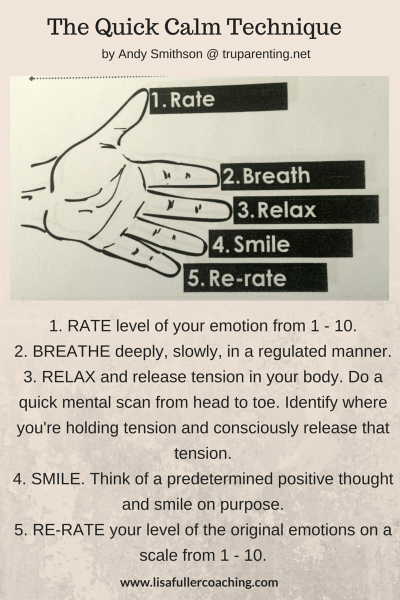
Click above to learn more about the entire Quick Calm Toolkit
Use this technique to bring yourself down from anger, anxiety, sadness… these steps enable you to respond more proactively — more mindfully — to any situation you find yourself caught up in. You have power over how you feel.
PASSIONATE VIEW: When you take time to nurture your own passions, you get less tied up in knots about the minutiae of your child’s life. This helps you avoid the unwitting substitution of your child’s experiences for your own.
Here are some examples of activities (outside of work and parenting) that parents have shared with me that bring meaning and passion to their lives:
- join an adult sports team
- volunteer in an underserved school
- write a blog or novel
- coach a team (outside of your child’s)
- volunteer at a hospital
- train for a triathlon
If you don’t want to do it for yourself, then you’ve got to do it for the sake of your kid. Only when you nourish yourself and cultivate your own interests will your child see a way to do this for herself.
MY VIEW: One of the gifts I’ve found through using Positive Discipline is a path to keep things simple.
If I’m bending over backward to make something happen for my kid, I hear that voice inside warning me something’s off or as Michelle put it — “THAT’s INSANITY — DON’T DO IT!”
Still the impulse and overwhelming sadness remains.
Don’t push it away. Rather, let yourself feel sad and have a chance to heal from your own old wound. When you get triggered by your child’s disappointments — take that step back from your kid and look inside — work on your own or with a therapist to experience your not so buried feelings so that you can move on rather than continuing to stuff it down or overreact to events in your child’s life. Be real and feel your feelings.
When you feel stuck in your own or your child’s disappointment, try one of these perspectives or cultivate a view of your own. Standing in a different place could be just the reset you need to reorient yourself and move forward in the direction you want to go.
If you haven’t already done so, join me on this journey!
Wanna talk? Schedule a time here.

 In recent weeks, a new book called “Grit,” by Dr. Angela Duckworth has made quite a splash, with coverage in news outlets from CBS News to NPR to the New York Times (even David Brooks loved it).
In recent weeks, a new book called “Grit,” by Dr. Angela Duckworth has made quite a splash, with coverage in news outlets from CBS News to NPR to the New York Times (even David Brooks loved it).













 MINDFUL VIEW: Practicing mindfulness strengthens your ability to have boundaries.
MINDFUL VIEW: Practicing mindfulness strengthens your ability to have boundaries.

